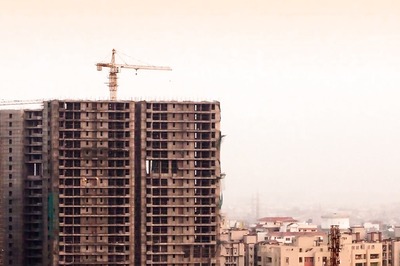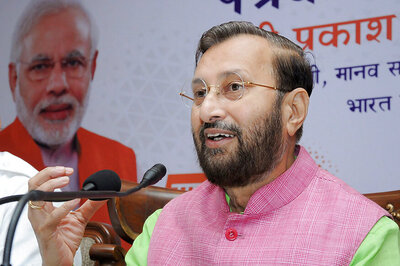
views
Lebanon: When the Arab Spring came to Talkalakh, the little Syrian hill town a few minutes walk from this border village, it seemed to last barely a moment. Squads of secret police descended on the town within hours of the first protests. Then the army came with its tanks, and the shadowy pro-government militia called the shabiha.
The May siege killed at least 36 civilians, activists say. Hundreds of people were arrested. Thousands fled. By mid-June, the Sunni Muslim town of 70,000 people had only a few dozen families remaining, according to residents who recently escaped into Lebanon, and those still there are constantly watched by security forces.
But when night falls, the Arab Spring comes back to Talkalakh. Because that is when the young people slip quietly to the rooftops of their concrete homes. And in the darkness they shout out for freedom and for the help of God. Silence returns only when soldiers begin blindly spraying gunfire.
As the early success of the Arab Spring has bogged down in turmoil - civil war in Libya, repression in Bahrain and anarchy in Yemen - Syria has become mired in its own bloody grind of protests and repression. Its stalemate is a reflection of the new and more complicated chapter in the string of Arab uprisings.
If much of the Syrian uprising has been cloaked by an authoritarian Damascus regime that expelled foreign journalists, the stakes could turn out to be far higher there than almost anywhere else in the Arab world.
In the balance are political reform for one of the region's most brutally repressive countries, and fear that the nation of 22 million people could descend into sectarian conflict that would draw in players from across the Middle East.
Residents of protesting towns describe relentless shelling of their neighborhoods. They pass around cell phone videos of young men so badly tortured that their corpses look like butchered meat. More than 1,400 Syrians have been killed in the crackdown, activists say, and 10,000 have been detained.
"Soldiers kick the faces of demonstrators under arrest, when they are handcuffed on the ground. They say: "You want freedom? This is your freedom!" said a bookish 21-year-old from Talkalakh who asked to be identified only by his first name, Zakariya, fearing retribution against relatives. "They think they can stop our protests by abusing us, but that is not going to work."
Like many demonstrators, he was surprised to find himself in the streets at all.
"We couldn't even imagine that we could talk like this, that we could ask for freedom," he said, standing in the shade of a tree on Wadi Khaled's quiet main street. But then satellite TV brought news of demonstrators overthrowing dictators in Tunisia and Egypt, and of political convulsions across the Middle East.
"It gave us the courage to raise our voices," he said.
However, three months after the protests spread to Syria, the country is in a political no-man's-land, with President Bashar Assad's regime unable to crush the tenacious grassroots opposition but unwilling to begin talks with them. Assad's most recent peace offering, a vague promise to consider political reforms, was quickly dismissed by the opposition as a ploy to buy time and hold onto power.
The regime "still believes it can crush the protests," said Rami Nakhla, a Syrian activist now living underground in Beirut who has spent months disseminating news and video clips sent from inside the country. "But it's clear the regime has played all its cards and the protests are not burning out. They're spreading."
At the same time, the activists have not managed so far to draw in Syria's middle class, resulting in protests that hopscotch across the country but seldom touch the largest cities.
The Assad regime has long used sheer brutality to hold together a fragile jigsaw puzzle of Middle Eastern backgrounds - Sunnis, Shiites, Alawites, Christians, Kurds, Druse, Circassians, Armenians and more. Sectarian violence is widely feared, and in the worst-case scenario the country could descend into a Lebanese-style civil war.
At the same time, Syria is an important geopolitical linchpin. It borders five other nations, has close ties to Iran and powerful militant groups, and controls water supplies to Iraq, Jordan and parts of Israel. Meanwhile, though Damascus and Israel are officially at war and Israel has occupied Syria's Golan Heights since 1967, their quiet, behind-the-scenes contact has sometimes been key to preventing the eruption of fighting.
"People are afraid of what could happen if Assad falls from power," said Elias Muhanna, a political analyst at Harvard University. At worst, it could become what he calls "an Iraq scenario," with armed militias carving out ethnic fiefdoms.
It is a fear that Damascus has carefully nurtured in recent months, warning repeatedly that only Assad can keep chaos at bay. And while most analysts say Assad is exaggerating, few deny that such violence is a serious possibility.
That is why many opposition figures are putting their hope on an unlikely player: the Syrian army. Dissidents say they are in touch with many lower-ranking soldiers, and have publicly urged top-ranking officers to oust Assad in a coup d'etat.
"We don't have other options right now," said Radwan Ziadeh, a prominent Syrian exile and a visiting scholar at the Institute for Middle East Studies at George Washington University. "We need the army officers to take the initiative."
Getting to that point, though, would require crossing a deep sectarian chasm.
Syria's deadlock is rooted in the divide between the Sunni Muslim majority and the Alawites, a Shiite offshoot that makes up about 11 percent of the country. The Assad family is Alawite, as are most key leaders in the army, the intelligence services and top businesses.
While Sunnis dominate the military's enlisted ranks, the top commanders are mostly Alawites. They also make up much of the army's feared 4th Division, which is led by Bashar Assad's brother Maher and used to crush the biggest protests, as well as the Republican Guard, which is responsible for protecting the capital, Damascus. Then there is the shabiha, the mafia-style militia the regime uses as enforcers, a network of fearsome young Alawite men known for dressing all in black.
The Alawites rose from economic obscurity after the 1970 coup led by Bashar Assad's father, Hafez, gaining power and financial muscle in exchange for loyalty to the Assads. It is their support that the younger Assad sees as the key to continued power.
Alawites claim they would be oppressed as Muslim heretics if the Sunnis come to power, and Sunnis claim they are unable to get the government jobs essential to reach the lower rungs of the middle class. Analyst Muhanna says the now-privileged Alawites would see majority rule as a nightmare.
"They would see it as the end of Alawite culture," he said. "The Alawites look at Syria the way the Jews look at Israel."
Whether or not the Alawite military commanders turn against Assad may depend on the new middle class.
For now, Assad counts on the support of a small but growing Syrian middle class, a mixture of Sunnis, Alawites and other ethnic groups that live mostly in the cities of Damascus and Aleppo. This newly monied class, mostly traders and small manufacturers, has seen life gradually improve since Hafez Assad died in 2000, and his son began opening up the country's economy.
"So far, they continue to think that Assad's regime ensures stability and continuity," said Hilal Khashan, a professor of political science at the American University of Beirut. "If they reach the conclusion that Assad is not their man, and the regime is not one to rely upon, they will join the protest movement."
That, he said, would be the point when the Syrian army would step in - when they believed a coup could keep economic chaos at bay while allowing Alawite military commanders to retain at least some power.
"In order to avert the specter of civil war, you would have to include the Alawites in a post-Bashar Assad political order," said Khashan.
While there has been no sign of a split in the military, the protests' momentum has yet to slow.
For every Talkalakh where demonstrations are crushed, others break out. Dozens of protests have erupted across the country. Most recently, the government laid siege to towns along the northern border, sending thousands of refugees streaming into Turkey.
In many ways, Syria's turmoil is not surprising. Across the Middle East, protesters have discovered that creating new governments is far more complicated than driving out old dictators.
The chaos in countries like Libya and Yemen is welcome to the Assad regime, which has carefully mixed vague promises of eventual reform with none-too-subtle warnings that Syria could also spiral into violence.
Government officials blame the protests on mysterious gunmen or Muslim extremists, while warning that Israel or other unnamed foreign powers are stage-managing the demonstrations. The opposition insistently denies any foreign involvement, and the scattered nature of the protests appears to indicate broad grassroots support and little central planning.
Still, dissidents acknowledge they began preparing for protests early this year, when it became clear that calls for democracy were spilling across the Arab world.
According to Ziadeh, an informal exile network smuggled satellite telephones and other communications gear into the country, presuming the government would clamp down on communications if protests began. That equipment has been essential to getting news out through the network of exile-activists. But as for Assad himself, he has been nearly invisible. He has spoken only three times in public since the protests erupted.
For the most part, he uses his speeches to talk about dangerous saboteurs and international conspiracies he insists are out to undermine Syria.
But he also makes clear that violence may be the ultimate answer.
"What is at stake is the homeland," he said in March 30 speech to Parliament. "The Syrian people are peaceful people, loving people, but we have never hesitated in defending our causes, interests and principles, and if we are forced into a battle, so be it."



















Comments
0 comment